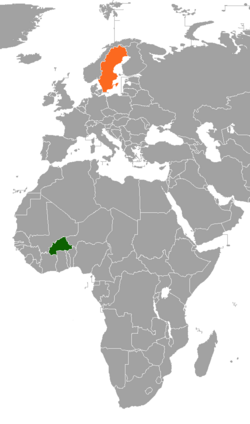Burkina Faso–Sweden relations
 | |
Burkina Faso |
Sweden |
|---|---|
Burkina Faso–Sweden relations refers to the current and historical relationship between Sweden and Burkina Faso. Burkina Faso has a non-resident ambassador located in Copenhagen, Denmark and an honorary consulate in Uppsala.[1] Sweden has an embassy in Ouagadougou, which was opened in 2010.
History
Sweden accredited its first ambassador to Burkina Faso, then known as the Republic of Upper Volta, in 1969. The ambassador was initially stationed in Lagos, Nigeria.[2][3]
The relations between Burkina Faso and Sweden have, due to the large distance between the two countries and the only minor bilateral trade, largely been defined by economic aid, in addition to some cultural and scientific exchange. A first Burkinabé student arrived in Sweden during the early 1970s, and have been followed by many more. Sweden participated in several exchange programmes with the country during the 1980s, with the first direct cooperation starting following a visit to the Sahel region by Foreign Minister Hans Blix. In 1986 – during the rule of Captain Thomas Sankara – the Burkina Faso–Sweden Friendship Association (ASSAMBUS) was formed.[4]
Burkinabé–Swedish cooperation in the 21st century takes many forms. In the field of science, Swedish universities [
Political relations
Several Swedish political parties have fraternal relations with Burkinabé opposition parties, and have established political cooperation, among the Centre Party (with the Alliance for Democracy and Federation – African Democratic Rally), the Christian Democrats (with the Union for the Republic) and the Left Party (with the African Independence Party, merged in 2012 to form the Party for Democracy and Socialism/Metba).[5]
Foreign aid
Sweden's government has been a major donor of aid to Burkina Faso in recent years, one of the six largest of all international contributors.[citation needed] A large-scale cooperation programme was launched in 2001. In 2012, the right-wing government of Prime Minister Fredrik Reinfeldt announced it would decrease aid to Burkina Faso, and cut the cooperation programme by 2016.[6] This decision faced criticism,[7] and was retracted in 2014 by a new centre-left government. Left Party foreign affairs spokesperson Hans Linde described this change in policy as an effect of political pressure from his party.[8]
See also
References
- ^ "Burkina Fasos honorärkonsulat". www.assambus.se (in Swedish). Burkina Faso–Sweden Friendship Association. Archived from the original on 7 November 2014. Retrieved 6 November 2014.
- Norstedts Förlag. Retrieved 8 November 2014.
- ^ "Dödsfall i Sverige". Helsingborgs Dagblad (in Swedish). Helsingborg. 21 February 2004. Archived from the original on 8 November 2014. Retrieved 8 November 2014.
- ^ Eriksson, Hans (2013). "30 år av svensk - burkinska kontakter" (PDF). Burkinakontakt (in Swedish) (1). Burkina Faso–Sweden Friendship Association: 35–36. Archived from the original (PDF) on 2014-11-07. Retrieved 6 November 2014.
- ^ a b Hagberg, Sten (2013). "Sverige och Burkina Faso: Ett utvecklingssamarbete med stora mervärden" (PDF). Burkinakontakt (in Swedish) (1). Burkina Faso–Sweden Friendship Association: 4–7. Archived from the original (PDF) on 2014-11-07. Retrieved 6 November 2014.
- ^ Tham, Sebastian (22 December 2014). "Utfasning av det bilaterala biståndet till Burkina Faso". www.regeringen.se (in Swedish). Government of Sweden. Archived from the original on 29 October 2014. Retrieved 6 November 2014.
- ^ "Indraget bistånd får kritik". Svenska Dagbladet (in Swedish). Stockholm. 27 December 2012. Retrieved 6 November 2014.
- ^ Resare, Nils (22 October 2014). "Fortsatt bistånd till Bolivia och Burkina Faso". OmVärlden (in Swedish). Stockholm. Archived from the original on 7 November 2014. Retrieved 6 November 2014.

